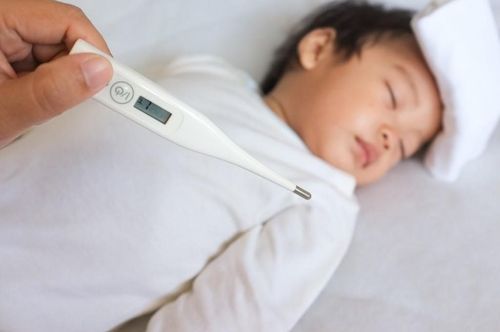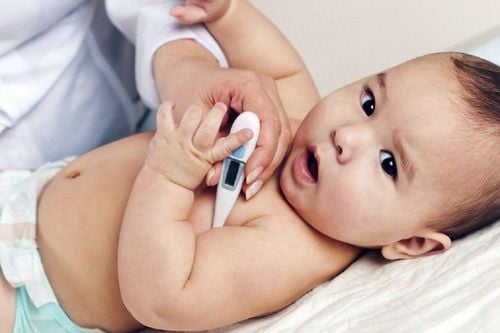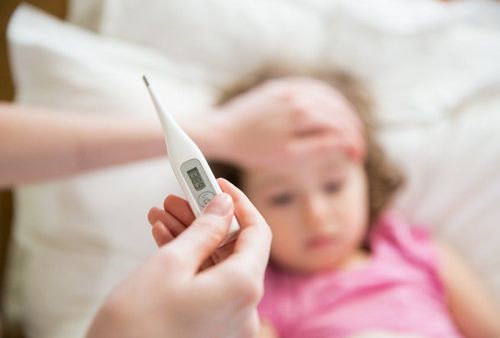This is an automatically translated article.
The article is professionally consulted by Specialist Doctor II Le Thanh Cam - Pediatrician - Pediatrics - Neonatology - Vinmec Danang International General HospitalViral fever is a common summer illness in children, manifested by a high fever of 39-40 degrees Celsius, accompanied by cough, runny nose, digestive disorders, rash,... Prevention of viral fever in children is a very important thing that parents need to understand to protect their children from this disease.
1. Manifestations of viral fever in children
High fever: The most typical symptom of viral fever or viral fever in children is a high fever of 39-40 degrees Celsius, sometimes even up to 40-41 degrees Celsius. Children in fever often show fatigue and little response to common antipyretic drugs. When the fever has subsided, the child is awake and active again; Body aches: Older children often complain of pain all over the body, especially the muscles; young children will cry a lot because of pain; Headache: In some cases, children with viral fever may have a headache but remain awake, not excited; Digestive disorders: If the cause of fever is a gastrointestinal virus, the child will have digestive disorders, manifested by loose stools, no blood, mucus. This manifestation may also appear later than a few days after the fever; Erythema: The rash usually appears 2-3 days after the fever, at this time the child's fever will be better.
2. How does viral fever in infants develop?
In the summer days, the number of children hospitalized for viral fever often increases rapidly, this may be because children, especially infants, do not have a good immune system, so they are very susceptible to infection. Under normal conditions, many viruses are parasitic on the respiratory tract, digestive tract, ... of children. As long as there are favorable conditions, they will develop, invade the body and cause disease.
Viruses that often cause fever in children include Myxovirus, Coxackie, Enterovirus, measles,... Viruses can be transmitted from sick people to healthy people, especially diseases caused by viruses in the digestive tract can break out into epidemics . The most typical symptom of a viral infection is a high fever, hence the medical term for this condition as viral fever.
Viral fever in infants develops rapidly with the above symptoms and will gradually decrease and disappear after 3-5 days, the child's health will return to normal.
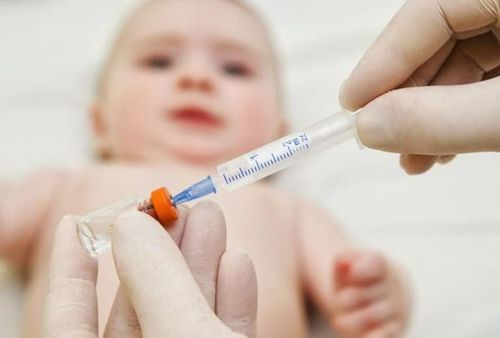
3. How to handle viral fever in children?
Most of the diseases caused by viruses have no specific treatment, mainly symptomatic treatment. The same goes for viral fever in children. Treatment measures when a child has a viral fever that parents can apply include:
Thermocouple for the child: Put the thermometer in the armpit or anus of the child. The thermometer should be kept in the armpit for at least 3 minutes with the child's arm against the chest wall. Reduce fever for children in 2 ways: Use antipyretic drugs: Usually take paracetamol at a dose of 10mg/kg, once every 6 hours; Cover the child with a cool towel, dry the sweat, let the child lie in a cool place and wear light clothes. Undress and remove blankets for the child if he has a high fever; Wipe the child's body with a warm towel: Use a soft, clean towel dipped in warm water mixed with the formula 1 cup of boiling water + 3-3.5 cups of cold water, wipe all over the child's body until the body temperature drops to 37 degrees Celsius. Note not to apply cold water because it will make the child have a higher fever due to the peripheral vasoconstriction mechanism; Anti-convulsant: Apply to children with high fever over 38.5 degrees. At this time, it is necessary to use antipyretic drugs with anticonvulsants as prescribed by the doctor, especially in children with a history of convulsions when high fever; Rehydration of fluids and electrolytes: For infants who need to breastfeed more often than usual, and give Oresol rehydration as directed. If the child cannot drink, use a clean cotton ball to dab this water on the lips and mouth of the child continuously to allow the mucous membrane of the lips and mouth to absorb water, avoiding the lack of water and electrolytes; Hygiene: Clean the child's body, bathe with warm water in a closed room. Give children eye and nose drops with 0.9% sodium chloride solution to avoid respiratory bacterial superinfection; Pay attention to nutrition: Children should eat thin foods such as porridge, soup, drink lots of filtered water, fruit juices such as oranges, lemons, etc. Parents need to take their children to the doctor as soon as they see that they have one of the following symptoms. present as a high fever over 38.5 degrees Celsius, especially 39 degrees Celsius that does not respond to antipyretics; Children are lethargic, lethargic, sleep a lot, have convulsions, headache continuously and gradually increase, nausea, vomiting, fever lasting more than 5 days.
4. Prevention of viral fever in infants
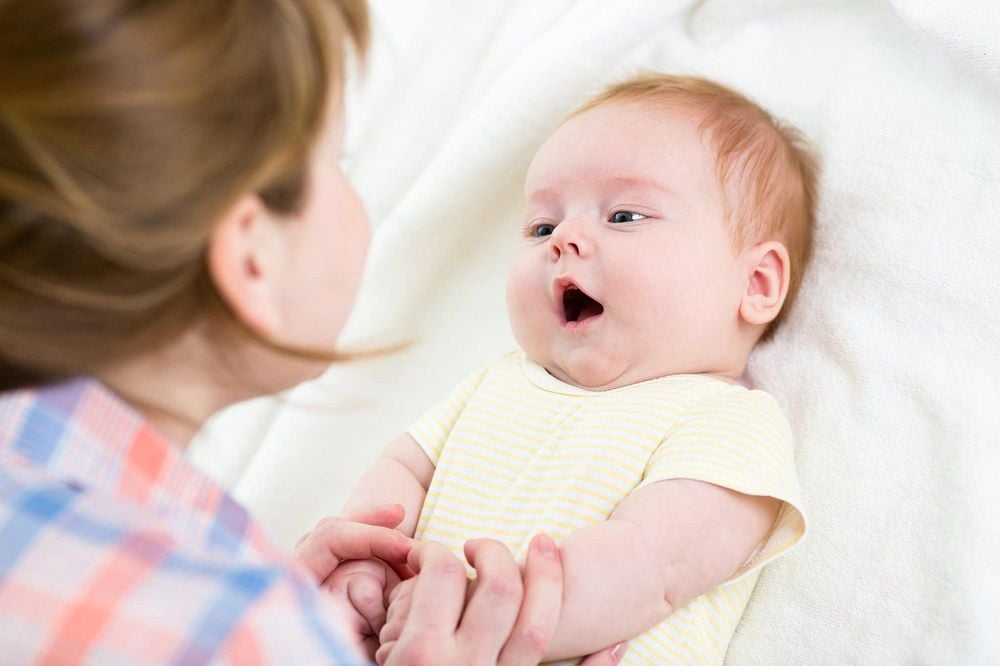
Viral fever is a very common disease in children in the hot season, especially children with poor resistance such as infants. Therefore, parents need to learn and practice well measures to prevent viral fever in babies, especially during the time when the disease is breaking out into an epidemic.
In fact, the prevention of viral fever for children is not easy, so it is very important to have patience and seriousness of parents. The generally recommended approach is to do a good job of isolating infants from sick people. If someone in the house is sick, you should minimize contact with children.
Besides, in order to prevent diseases during the change of seasons, it is necessary to strengthen children's comprehensive resistance by giving them enough water to drink, and eating foods rich in zinc, vitamin C, vitamin A:
Rich foods Zinc includes: Oysters, lean meat, pork liver, fish, egg yolks,... Foods rich in vitamin C include: Oranges, tangerines, pears, strawberries, celery, green bell peppers,... Food Rich in vitamin A, including: Carrots, animal liver, red meat, spinach, papaya or other red fruits,... The activity and activity regime in children needs to be reasonable, ensuring harmony in the environment. sleep - rest. It is necessary to keep children's hygiene by washing hands, keeping them clean when playing to remove dangerous pathogens from children's hands.
To prevent viral fever and other diseases in children, parents should add some supportive foods containing lysine, essential micro-minerals and vitamins such as zinc, chromium, selenium, B vitamins, ... helps to fully meet the needs of nutrients while supporting the immune system, enhancing resistance, reducing the risk of upper respiratory tract infections, bronchitis, flu.
Lysine is very necessary for the development of children, Lysine promotes the production of digestive enzymes to stimulate children to eat better and digest easily and effectively, increase food metabolism, maximize absorption of nutrients. Nutrition from food. Fortifying lysine for babies also helps the body create antibodies, develop resistance to help reduce cough, thin phlegm in children.
Parents can learn more:
Why do you need to supplement Lysine for your baby?
Please regularly visit Vinmec.com website and update useful information to take care of your baby and family.
Please dial HOTLINE for more information or register for an appointment HERE. Download MyVinmec app to make appointments faster and to manage your bookings easily.







